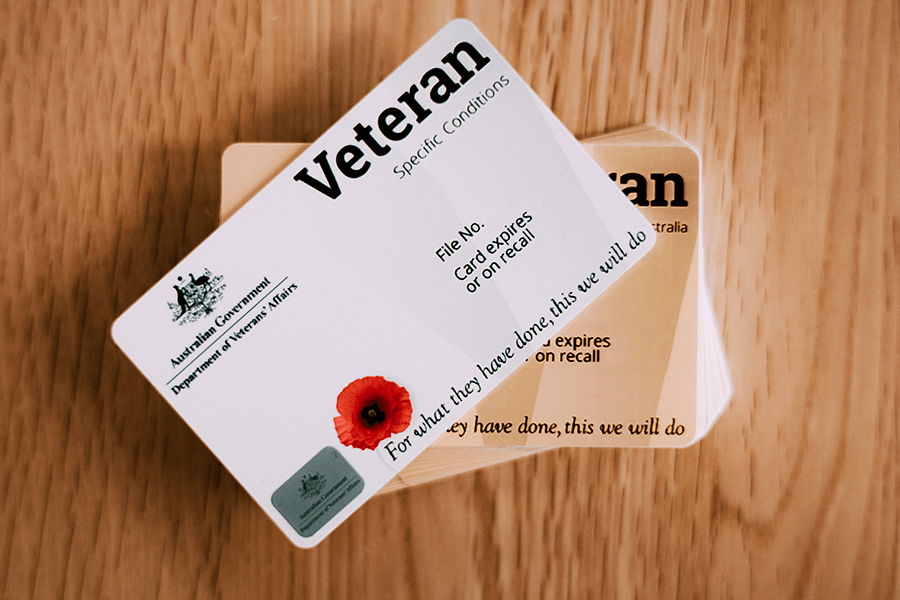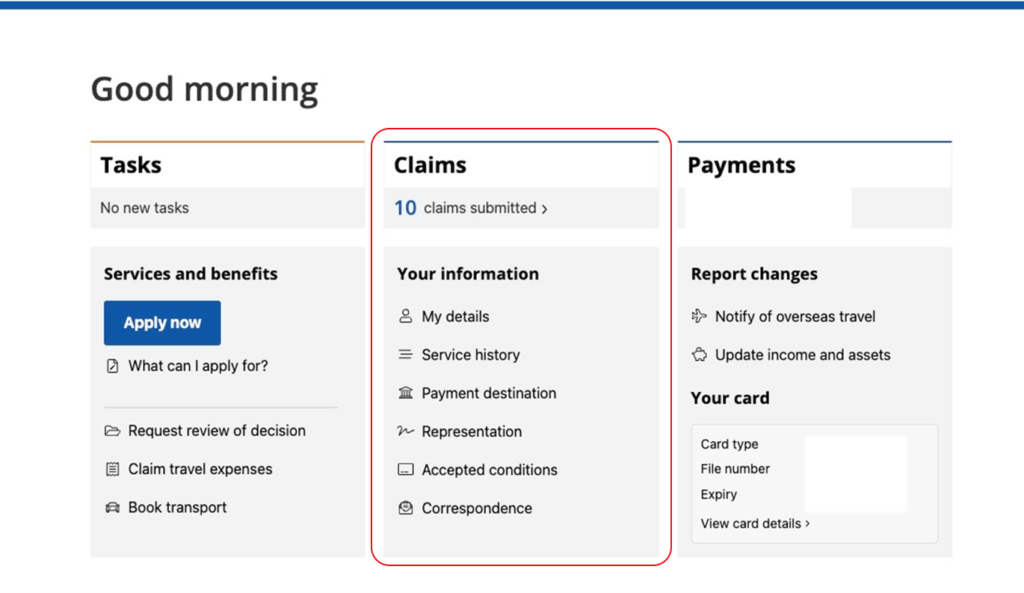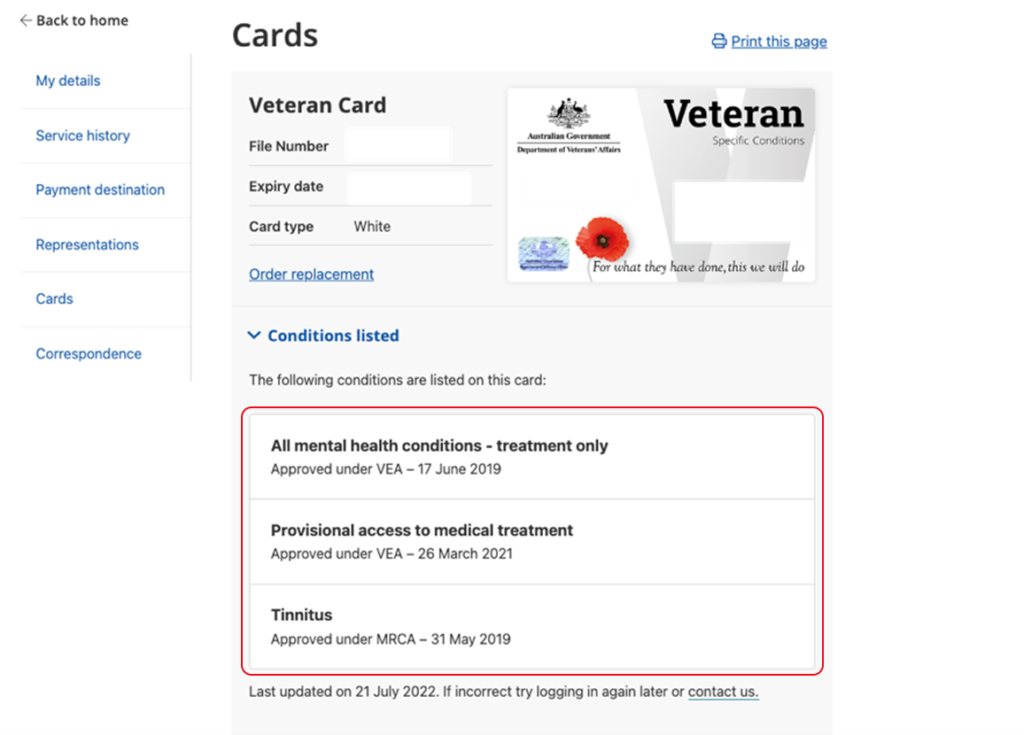Waking up to another day of persistent and often disabling pain is the reality that approximately one in six Australian veterans face, limiting even simple tasks like taking walks, grocery shopping, seeing friends, or getting a restful night’s sleep.
It’s easy to associate chronic pain with only physical symptoms such as low back pain or joint pain, and then work with a single health professional like a physiotherapist through the DVA to help with your physical symptoms and limitations. As a result, our team often sees many people and caregivers miss the massive effects of chronic pain on a person’s mental health – something which absolutely must also be prioritised and managed in order to relieve pain and improve day-to-day comfort.
As such, the team here at Veteran Benefits Australia have adopted a combined, all-inclusive approach to treating all types of chronic pain that gives you funded access to a psychologist, nutritionist, physiotherapist and exercise physiologist caring for you simultaneously – and it has led to our patients feeling more supported, heard and understood throughout their care. Here’s a look into how a combined care program may be the key you’re missing to living a more comfortable life and getting the best long-term outcomes for your chronic pain.
Chronic Pain Is Much More Than Physical
The effects of chronic pain don’t end when you go to take that next step and abruptly stop, needing a moment to sit and rest. The reverberating effects leave almost half of older veteran feeling anxious, depressed, irritable, and often suffering significant emotional distress that may affect their self-esteem and put a negative lens on the way they see themselves and the world.,
Looking into chronic pain, research shows that there are a variety of factors that affect the heightened and disconnected sense of pain that is experienced. These can include past injuries or traumas, genetic conditions, disabilities, mental conditions, nutrition, emotional state, activity levels – even past medical care like surgery.
With such a complex and multifaceted condition that doesn’t follow the normal patterns of pain science and traditional medicine, it makes sense that seeing only a single practitioner to help manage your chronic pain, or seeing practitioners that specialise in only one area like musculoskeletal health, may leave you missing out on valuable insights and strategies that come from the expertise of others. This is where a combined team approach comes in.
A Combined Team Magnifies The Benefits Of Your Chronic Pain Treatment
The effects of chronic pain don’t end when you go to take that next step and abruptly stop, needing a moment to sit and rest. The reverberating effects leave almost half of older veteran feeling anxious, depressed, irritable, and often suffering significant emotional distress that may affect their self-esteem and put a negative lens on the way they see themselves and the world.,
Looking into chronic pain, research shows that there are a variety of factors that affect the heightened and disconnected sense of pain that is experienced. These can include past injuries or traumas, genetic conditions, disabilities, mental conditions, nutrition, emotional state, activity levels – even past medical care like surgery.
With such a complex and multifaceted condition that doesn’t follow the normal patterns of pain science and traditional medicine, it makes sense that seeing only a single practitioner to help manage your chronic pain, or seeing practitioners that specialise in only one area like musculoskeletal health, may leave you missing out on valuable insights and strategies that come from the expertise of others. This is where a combined team approach comes in.
A Combined Team Magnifies The Benefits Of Your Chronic Pain Treatment
Having a collaborative team that includes a psychologist, nutritionist, physiotherapist and exercise physiologist on your side simultaneously brings their wealth of knowledge and experience to your specific circumstances and what you’re experiencing to paint a complete picture, magnifying your benefits and results. For example, while your exercise physiologist may be supporting you to move more comfortably through daily life, your nutritionist may identify that certain dietary deficiencies or habits may be exacerbating your pain, or be contributing to other health-related problems that add to your pain. Managing both together will yield better outcomes than any one mode of care in isolation – and this is just one of hundreds of examples.
Additionally, as chronic pain is often accompanied by other problems for veterans, your team also looks at the role of these in your pain, and continues to focus on getting you the best long-term outcomes for not just your physical well-being, but your mental and emotional health, too. The team we have selected for chronic pain each play unique and important roles:
- Psychologist: While many of us will recognise the ways that pain can affect our mind, we often under-estimate the ability of our mind to affect our pain. This is where your psychologist can understand how everything from our sleep to our PTSD, grief, addictions or other mental health concerns may be triggering or worsening the chronic pain we feel, offering practical coping skills and strategies to better manage these, which in turn helps relieve our pain.
- Exercise Physiologist: Many veterans avoid exercise out of fear that it will exacerbate their pain and leave them feeling worse, without realising that restricting movement only deconditions the body and worsens pain. Exercise physios create personalised and realistic movement plans so you can continue to reap the benefits of regular movement, which aside from pain management, may help with weight, overall mobility, mental and emotional wellbeing, and your quality of life.
- Physiotherapist: Physios can uncover concurrent movement-related problems that may be contributing to your pain, as well as use hands-on techniques such as massage or mobilisation to help relieve pain and improve comfort. Your physio can also address elements like posture, which can often contribute to chronic low back pain.
- Nutritionist: Chronic pain can have diet-related triggers, and our nutrition can also greatly affect our physical, mental and emotional health – all of which can manifest as chronic pain. This can look like addressing underlying nutritional deficiencies, exploring how the role of certain foods and nutrients can reduce inflammation, and addressing person-specific barriers to good nutrition – like how to have long-lasting ready made foods, instead of meals that spoil when refrigerated or frozen.
Your Combined Chronic Pain Care Is Funded Under Your Gold Card
Our combined chronic pain management program sees you have a dedicated team of trusted and knowledgeable health professionals that are highly experienced in working specifically with veterans. Together, they ensure you remain fully supported along the way, have all questions answered, and help you get the best results for your pain and your health. If eligible, many of our patients’ care is fully funded for DVA Gold Card holders, with telehealth options also available to make health access simple and easy.
To get started towards a happier and more comfortable life, get in touch with the Veteran Benefits team here.
1 https://pubmed.ncbi.nlm.nih.gov/12514452/
2 https://iprcc.nih.gov/docs/032712_mtg_presentations/iom_pain_report_508comp.pdf









